
Vladimir Vladimirovich Putin is a Russian politician and former intelligence officer who is the president of Russia. Putin has held continuous positions as president or prime minister since 1999: as prime minister from 1999 to 2000 and from 2008 to 2012, and as president from 2000 to 2008 and since 2012. He is the longest-serving Russian or Soviet leader since Joseph Stalin.

Grigory Alekseyevich Yavlinsky is a Russian economist and politician. He has held numerous positions in the Soviet and Russian governments across different levels, including in the State Duma.

Russian Public Opinion Research Center (RPORC) is a state-owned polling institution established in 1987, known as the All-Union Center for the Study of Public Opinion until 1992.

Aleksandr Gelyevich Dugin is a Russian far-right political philosopher.
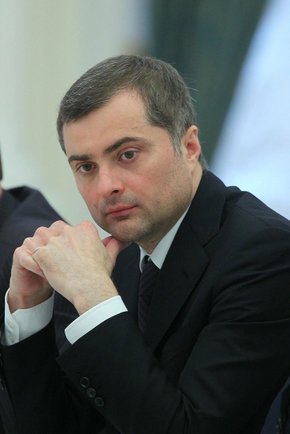
Vladislav Yuryevich Surkov is a Russian politician and businessman. He was First Deputy Chief of the Russian Presidential Administration from 1999 to 2011, during which time he was often viewed as the main ideologist of the Kremlin who proposed and implemented the concept of sovereign democracy in Russia. From December 2011 until May 2013, Surkov served as the Russian Federation's Deputy Prime Minister. After his resignation, Surkov returned to the Presidential Executive Office and became a personal adviser of Vladimir Putin on relationships with Abkhazia, South Ossetia and Ukraine. He was removed from this duty by presidential order in February 2020.

Ilya Valeryevich Yashin is a Russian opposition politician who led the People's Freedom Party (PARNAS) from 2012 to 2016, and then its Moscow branch. He was also head of the Moscow municipal district of Krasnoselsky and former chairman of the Council of Deputies of the Krasnoselsky district from 2017 to 2021.

Richard Sakwa is a British political scientist and a former professor of Russian and European politics at the University of Kent, a senior research fellow at the National Research University-Higher School of Economics in Moscow, and an honorary professor in the Faculty of Political Science at Moscow State University. He has written books about Russian, Central and Eastern European communist and post-communist politics.

Nina Khrushcheva is a Russian–American professor of International Affairs at The New School in New York City, and a Contributing Editor to Project Syndicate, an "Association of Newspapers Around the World", that funds projects globally, under the aegis of the Open Society Foundations.

Simeon Dyankov is a Bulgarian economist. From 2009 to 2013, he was the deputy prime minister and minister of finance of Bulgaria in the government of Boyko Borisov. He has been a vocal supporter of Bulgaria's entry into the Eurozone. Before his cabinet appointment, he was the chief economist of the finance and private sector vice-presidency of the World Bank.
The Levada Center is a Russian independent, nongovernmental polling and sociological research organization. It is named after its founder, the first Russian professor of sociology Yuri Levada (1930–2006). The center traces back its history to 1987 when the All-Union Public Opinion Research Center (VTsIOM) was founded under the leadership of academician Tatyana Zaslavskaya. As one of Russia's largest research companies, the Levada Center regularly conducts its own and commissioned polling and marketing research. In 2016, it was labelled a foreign agent under the 2012 Russian foreign agent law.
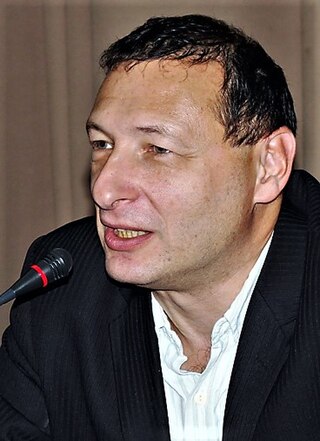
Boris Yulyevich Kagarlitsky is a Russian Marxist theoretician and sociologist who has been a political dissident in the Soviet Union and the Russian Federation. He is an associate of the Transnational Institute. Kagarlitsky is the director of Institute of Globalisation Studies and Social Movements (IGSO) and editor in chief of Levaya Politika quarterly in Moscow. Kagarlisky hosts a YouTube channel Rabkor, associated with his online newspaper of the same name.
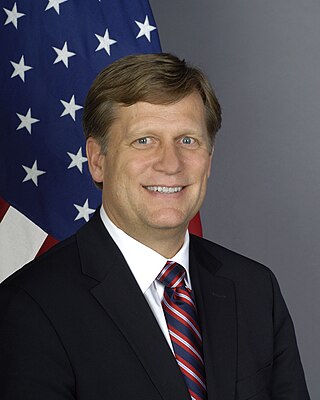
Michael Anthony McFaul is an American academic and diplomat who served as the United States ambassador to Russia from 2012 to 2014. McFaul is currently the Ken Olivier and Angela Nomellini Professor in International Studies in the Department of Political Science at Stanford University, where he is the Director of the Freeman Spogli Institute for International Studies. He is also a Peter and Helen Bing Senior Fellow at the Hoover Institution. He is also a contributing columnist at The Washington Post. Prior to his nomination to the ambassadorial position, McFaul worked for the U.S. National Security Council as Special Assistant to the President and senior director of Russian and Eurasian affairs, where he was the architect of U.S. President Barack Obama's Russian reset policy.

Since 1999, Vladimir Putin has continuously served as either President or Prime Minister of Russia.

Teodor Shanin was a British sociologist who was for many years Professor of Sociology at the University of Manchester. He was credited with pioneering the study of Russian peasantry in the West, and is best known for his first book, The Awkward Class: Political Sociology of Peasantry in a Developing Society, Russia, 1910–25. After the collapse of the Soviet Union, Shanin moved to Russia where, with funding from The Open Society Institute, Ford Foundation and others, he founded the Moscow School for the Social and Economic Sciences in 1995. Shanin was President of the Moscow School, Professor Emeritus of the University of Manchester, and an Honorary Fellow of the Russian Academy of Agricultural Sciences.

Opposition to the government of President Vladimir Putin in Russia, commonly referred to as the Russian opposition, can be divided between the parliamentary opposition parties in the State Duma and the various non-systemic opposition organizations. While the former are largely viewed as being more or less loyal to the government and Putin, the latter oppose the government and are mostly unrepresented in government bodies. According to Russian NGO Levada Center, about 15% of the Russian population disapproved of Putin in the beginning of 2023.

Simon Clarke was a British sociologist who specialised in social theory, political economy, labour relations, and the history of sociology. He had a particular interest in employment relations in China, Vietnam, and the former-Soviet nations. He was Professor Emeritus of Sociology at the University of Warwick.
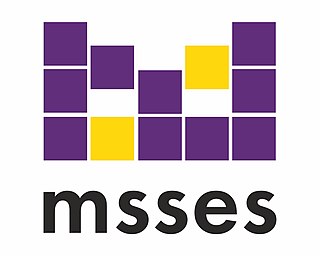
The Moscow School of Social and Economic Sciences (Shaninka) (Russian: Московская высшая школа социальных и экономических наук) is a non-state university founded in 1995 by Teodor Shanin, a renowned sociologist, peasant studies researcher, historian, and professor at the University of Manchester. Since 2011, the Rector of MSSES is Sergey Zuev.
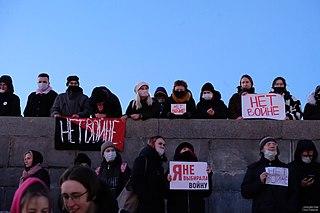
Following the Russian invasion of Ukraine on 24 February 2022, anti-war demonstrations and protests broke out across Russia. As well as the demonstrations, a number of petitions and open letters have been penned in opposition to the war, and a number of public figures, both cultural and political, have released statements against the war.

Ruscism, also known as Rashism, Russism, or Russian fascism, is a term used by a number of scholars, politicians and publicists to describe the political ideology and the social practices of the Russian state in the late 20th and early 21st centuries, especially during the rule of Vladimir Putin. "Ruscism" and "Russism" are portmanteaus which combine the words 'Russian' and 'fascism'; "Rashism" is a rough transcription of the Russian and Ukrainian equivalents. It is also used in reference to the ideology of Russian military expansionism, and has been used as a label to describe an undemocratic system and nationality cult mixed with ultranationalism and a cult of personality. That transformation was described as based on the ideas of the "special civilizational mission" of the Russians, such as Moscow as the third Rome and expansionism, which manifests itself in anti-Westernism and supports regaining former lands by conquest. The term "Rashist" is also widely used by Ukrainian officials and media to more generally identify members of the Russian Armed Forces and supporters of Russian military aggression against Ukraine.

On 24 February 2022, Russia invaded Ukraine in a major escalation of the Russo-Ukrainian War which began in 2014. The invasion caused Europe's largest refugee crisis since World War II, with more than 8.2 million Ukrainians fleeing the country and a third of the population displaced. The invasion also caused global food shortages. Reactions to the invasion have varied considerably across a broad spectrum of concerns including public reaction, media responses, and peace efforts.


















